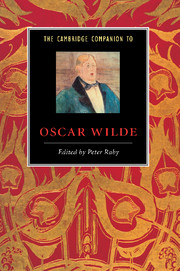2 - Wilde and the Victorians
from Part I - Context
Published online by Cambridge University Press: 28 May 2006
Summary
Wilde died in 1900, the year before Queen Victoria and the same year as Nietzsche. Dating him in such a way evokes the modernity of the Victorian age, with its values of progress, technology, global markets and individualism. It also evokes the postmodernism of Nietzsche, the philosopher with whom Wilde is most often compared, in their transvaluation of values, in the second half of the twentieth century. The Victorians agonised over values - family values, British values, value as use or exchange - while Nietzsche revealed value as a fraud, a tool of domination of some over others, on the one hand, and promoted a radical perspectivism or scepticism, on the other. Wilde, a figure of paradox and contradiction, participated in both modern value critique and postmodern perspectivism.
Modernism in social theory, as distinguished from modernist aesthetics, refers to processes that began to be theorised during the European Enlightenment. First among these were the democratic revolutions - the abolition of race slavery, the enfranchisement of working men and then women, and the struggle for increasing circles of rights - until today one speaks of the rights of many social groups, children, (non-human) animals, even non-animal life, as in radical ecology. Inseparable from the conditions that gave rise to the democratic revolutions was the growth in scientific knowledge and technology that led to the economic and population explosion that we call the industrial revolution: it was in fact the political economists rather than the moralists who first argued against slavery, as an inefficient use of labour. It is important at the outset to note that for the Enlightenment and for the Victorian modernists described here, progress was a moral and political category as much as a technological or economic one.
- Type
- Chapter
- Information
- The Cambridge Companion to Oscar Wilde , pp. 18 - 33Publisher: Cambridge University PressPrint publication year: 1997
- 2
- Cited by



